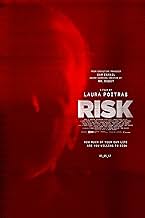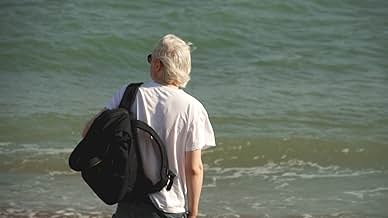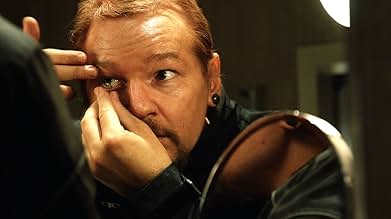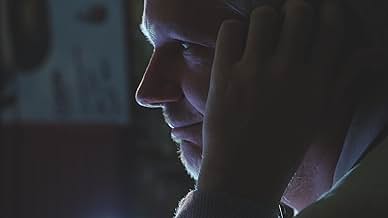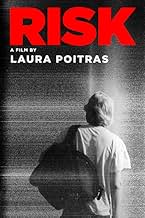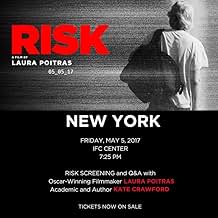IMDb-BEWERTUNG
6,3/10
2406
IHRE BEWERTUNG
Die Geschichte von WikiLeaks-Chefredakteur Julian Assange, erzählt von der Dokumentarfilmerin Laura Poitras.Die Geschichte von WikiLeaks-Chefredakteur Julian Assange, erzählt von der Dokumentarfilmerin Laura Poitras.Die Geschichte von WikiLeaks-Chefredakteur Julian Assange, erzählt von der Dokumentarfilmerin Laura Poitras.
- Regie
- Drehbuch
- Hauptbesetzung
- Auszeichnungen
- 4 Nominierungen insgesamt
Laura Poitras
- Self
- (Synchronisation)
Louis Bladel
- Self - FBI counterintelligence
- (as Special Agent Louis Bladel)
Hillary Clinton
- Self
- (Archivfilmmaterial)
James Comey
- Self
- (Archivfilmmaterial)
Anderson Cooper
- Self
- (Archivtonaufnahmen)
Empfohlene Bewertungen
I was expecting to gain some insight from RISK, which is said to have been filmed over six years. Instead, I came away wondering what the point of the film was supposed to be. If Laura Poitras had not directed CitizenFour, I would probably conclude on the basis of this work that she is a mediocre filmmaker. The only thing I really learned is that Julian Assange appears to have been physically involved with Susan Harrison but did not seem (at least from the film clips) to like her very much. The relationship ended after she helped Snowden when it was no longer safe for her to travel back to London, given the real risk of being arrested. The most interesting part of the film is the presentation of Susan Harrison, which raises the questions of why and how she became involved in the cases of both Julian Assange and Edward Snowden.
The directorial voice-over "production notes" are ridiculous and should not be in this work at all. Who cares? What is this film really supposed to be about? Just another symptom of these narcissistic times... As regards Assange himself, Risk strikes me as something of a nothing burger.
The directorial voice-over "production notes" are ridiculous and should not be in this work at all. Who cares? What is this film really supposed to be about? Just another symptom of these narcissistic times... As regards Assange himself, Risk strikes me as something of a nothing burger.
In Risk, Laura Poitras, who in 2013 got called specifically by Edward Snowden to be there to document the moment he decided to release the information on how the government was mass-collecting data and spying on the US public at large, she puts her attention on Julian Assange. She actually started filming years before, around the time when Assange was first dealing with the fall-out of the rape allegations (still going on to this day, or at least the one that hasn't expired - what's going on with that, we don't know by the film's end, one can assume it's still pending). She originally screened a version at Cannes in 2016, but because of the banana-animal-crackers-WTF train that was the election, and Assange's role in (arguably) affecting a great deal of the outcome for voters concerned about the leaked DNC emails, she had to update it to reflect that outcome.
So this promises to be a rather expansive look at this man and his times, and I suppose in a way it is. There are also some gaps; the movie jumps from when Assange gets into the Ecuadorian embassy in the UK via asylum (where, by the way, he has a personal trainer guy to help him, uh, stay in shape while not able to go outside, yes this is seen) to (briefly) a bit about Snowden and how one of Assange's lawyers got involved, and then it goes right to 2016. I wish we could've seen what happened, if only briefly, in those few years. Was nothing of consequence done by Wikileaks in that time? To an outsider, it might appear so, or at least in the shadow of people like Snowden and Manning perhaps Assange didn't have much to do while in exile... until those DNC emails, of course.
At times this is interesting, but it lacks the narrative focus and suspense of Citizenfour. Then again comparing to other Assange movies, or at least one documentary, I think it's not necessarily that I *must* learn something new about the man, but I still consider We Steal Secrets, the Gibney doc from 2013, to have a more comprehensive *story* about this man (not to mention the focus on Manning, who is almost a footnote here). It gets a little better in the third act, after we're done seeing what Assange was doing in those heady years of 2010 to 2012, once it gets into 2016, but that also feels too short and we don't get enough from Assange to see where his head was at when it came to the release of the DNC emails.
And I get what Poitras is trying to do here, and it's admirable that it's not the same thing as that we might get in a talking-heads Gibney approach; we're seeing process unfold as far as how Assange talks to his lawyers and associates; how he gets his message across to a spokesperson when talking about an info dump on Syrian military matters; how the news-people comment. But at the same time I'm not sure if there is an engaging through-line; with Citizenfour, to go back to that again, if you can get a really strong emotion going through your film (like in that one, total intensity and suspense of the moment), you can get by showing those small moments going on when not much seems to be happening. With Risk, it's... Lady Gaga now is going to do a (somewhat) shallow interview with Assange where she's halfway engaged with him and we get to see Assange with one of his people in the, uh, woods and he's paranoid about other people listening in.
And... yeah, it's a series of things, with a more compelling character, Jacob Applebaum, popping up sometimes as the man behind "Tor" and who, most interestingly, has a relationship off-screen with Poitras that ends with him being sexually abusive to one of her friends(?!) Wow, where's that movie? Come to think of it, will there be a third movie about a hacker? Maybe the real piece of work Applebaum - followed by an Avengers like team up with Assange and Snowden? As far as showing the cult-like world that Julian Assange has created for himself goes, the depiction of that is captivating. But there's not enough *there* there, if you get my meaning. I wanted a little more of *some* sense of a side she was taking, even if she wanted to keep ambiguity.
So this promises to be a rather expansive look at this man and his times, and I suppose in a way it is. There are also some gaps; the movie jumps from when Assange gets into the Ecuadorian embassy in the UK via asylum (where, by the way, he has a personal trainer guy to help him, uh, stay in shape while not able to go outside, yes this is seen) to (briefly) a bit about Snowden and how one of Assange's lawyers got involved, and then it goes right to 2016. I wish we could've seen what happened, if only briefly, in those few years. Was nothing of consequence done by Wikileaks in that time? To an outsider, it might appear so, or at least in the shadow of people like Snowden and Manning perhaps Assange didn't have much to do while in exile... until those DNC emails, of course.
At times this is interesting, but it lacks the narrative focus and suspense of Citizenfour. Then again comparing to other Assange movies, or at least one documentary, I think it's not necessarily that I *must* learn something new about the man, but I still consider We Steal Secrets, the Gibney doc from 2013, to have a more comprehensive *story* about this man (not to mention the focus on Manning, who is almost a footnote here). It gets a little better in the third act, after we're done seeing what Assange was doing in those heady years of 2010 to 2012, once it gets into 2016, but that also feels too short and we don't get enough from Assange to see where his head was at when it came to the release of the DNC emails.
And I get what Poitras is trying to do here, and it's admirable that it's not the same thing as that we might get in a talking-heads Gibney approach; we're seeing process unfold as far as how Assange talks to his lawyers and associates; how he gets his message across to a spokesperson when talking about an info dump on Syrian military matters; how the news-people comment. But at the same time I'm not sure if there is an engaging through-line; with Citizenfour, to go back to that again, if you can get a really strong emotion going through your film (like in that one, total intensity and suspense of the moment), you can get by showing those small moments going on when not much seems to be happening. With Risk, it's... Lady Gaga now is going to do a (somewhat) shallow interview with Assange where she's halfway engaged with him and we get to see Assange with one of his people in the, uh, woods and he's paranoid about other people listening in.
And... yeah, it's a series of things, with a more compelling character, Jacob Applebaum, popping up sometimes as the man behind "Tor" and who, most interestingly, has a relationship off-screen with Poitras that ends with him being sexually abusive to one of her friends(?!) Wow, where's that movie? Come to think of it, will there be a third movie about a hacker? Maybe the real piece of work Applebaum - followed by an Avengers like team up with Assange and Snowden? As far as showing the cult-like world that Julian Assange has created for himself goes, the depiction of that is captivating. But there's not enough *there* there, if you get my meaning. I wanted a little more of *some* sense of a side she was taking, even if she wanted to keep ambiguity.
The reviews for this documentary are all over the place. Reviewers who are firm advocates of WikiLeaks tend to over-exaggerate the film's virtues, while those who find the organization's actions reprehensible tend to hate it. I watched the film as an objective reviewer.
Some have called the film a sleeper and there are parts of the film that live up to that branding. These occur mainly at the beginning of the film when scenes shift quickly and conversations are somewhat baffling and vapid.
Assange emerges as an emotionally remote character who hides his true personality behind his dedication to WikiLeaks. He even states that what he does is more important than who he is. The only scene in which we get a glimpse into his repressed character is when he is interviewed by Lady Gaga, dressed in her Wicked-Witch-of-the West costume. Ms. Gaga, like most celebrities, tries to hide her insecurity behind false bravado and seemingly unfiltered, carefree questions which tell us more about her than Assange. In a clear case of projection, she asks about his relationship to his parents, wherein Assange claimed his father was "abstract".
We do get some glimpses into the life Assange lives within the Ecuadorean Embassy. We learn about his relationships with his team and find out a few ways that the organization keeps itself protected from government intrusion. This may hold some interest for some viewers.
The latter half of the film is more interesting, especially when he talks about the DNC hacking. I only wish this were expanded more as it is more timely. It is at this point in the film that Assange talks about the earth as so interconnected that any action must be considered a global action. It is an interesting an important viewpoint that should be considered. It is not simply "think globally, act locally". It is more that even a small local action may have global implications.
The film leaves many questions unanswered and, as a whole, doesn't flow very well. It could have been better made. There is nothing compelling in it, meaning that a viewer may be tempted to stop watching the film entirely at certain points. There is no hook that makes us want to see how it ends. There are no compelling relationships and some issues seem unresolved that could easily have been. Still, a few scenes are definitely worth seeing.
For those interested in the world of cyber security, political intrigue, and government surveillance, this documentary may be of interest. For the general public, however, it may simply be too dull.
Some have called the film a sleeper and there are parts of the film that live up to that branding. These occur mainly at the beginning of the film when scenes shift quickly and conversations are somewhat baffling and vapid.
Assange emerges as an emotionally remote character who hides his true personality behind his dedication to WikiLeaks. He even states that what he does is more important than who he is. The only scene in which we get a glimpse into his repressed character is when he is interviewed by Lady Gaga, dressed in her Wicked-Witch-of-the West costume. Ms. Gaga, like most celebrities, tries to hide her insecurity behind false bravado and seemingly unfiltered, carefree questions which tell us more about her than Assange. In a clear case of projection, she asks about his relationship to his parents, wherein Assange claimed his father was "abstract".
We do get some glimpses into the life Assange lives within the Ecuadorean Embassy. We learn about his relationships with his team and find out a few ways that the organization keeps itself protected from government intrusion. This may hold some interest for some viewers.
The latter half of the film is more interesting, especially when he talks about the DNC hacking. I only wish this were expanded more as it is more timely. It is at this point in the film that Assange talks about the earth as so interconnected that any action must be considered a global action. It is an interesting an important viewpoint that should be considered. It is not simply "think globally, act locally". It is more that even a small local action may have global implications.
The film leaves many questions unanswered and, as a whole, doesn't flow very well. It could have been better made. There is nothing compelling in it, meaning that a viewer may be tempted to stop watching the film entirely at certain points. There is no hook that makes us want to see how it ends. There are no compelling relationships and some issues seem unresolved that could easily have been. Still, a few scenes are definitely worth seeing.
For those interested in the world of cyber security, political intrigue, and government surveillance, this documentary may be of interest. For the general public, however, it may simply be too dull.
Preferring to find a movie on what the theme is and liking more imported foreign films and documentaries than those made in prolific USA, here the main person and the well-known 'Wikileaks' was an instant click, so had to go and see & learn more than mass media informs us about Julian Assange. And this writer was totally fascinated and involved throughout entire film.
While Poitras' personal inserted comments came in - but voiced more quietly,volume down- we had to attended more to hear and absorb these inserts. We needed to hear these added, helpful information bits to the scenes portrayed.
Assange was mostly seen in close-ups, so his every impartially-held facial expression could still not be easily read. But some good glimpses of his attitude were revealed anyhow. He hid some when filmed, even while talking lots, and he sometimes droned on ....so when his words were mumbled / hummed Assange was heard less. So while he was carefully conveying some info in his not-subtle ways, at times he left this writer confused, as when he refused to give direct answers to clear questions asked in film.
His female associates were not identified if in what kind of 'relationship' to Julian, or what their expertise was.... other than being always there, supportive, helping him groom or make escapes. That women were always in the " rescuer" roles left the impression that they may be & still are attracted to Julian as "hero", and thus to do the usual 'woman's work' only. As only assistants ?
Their other values, whatever they are, were not clarified nor appreciated either. Julian's mother, also included in such roles, was seen as only-adjunct helper. Can this be so ?
But other scenes showed Julian more actually responding to his circumstances -which is mostly well known & displayed in ordinary TV news clips.
His complaints - while living well - and while limited to living in only 1 fancy embassy- bldg seemed petulant and childish, as he refused to admit responsibility to eliciting the 'unexpected unwanted consequences' to his work . His own actions affected many political people, who still want to censor and punish any 'whistle-blowers', including but not just Assange.
Wikileaks has emerged as a very influential media platform source and as a threat to those who prefer their secrets kept away from the many people the actions do affect, kill, and distort . Many lives may have been/ are still changed from their exposures, as noted even in the most recent / now current events.
To learn more about the main man, tho not the only 1, who still holds dominance on the organization is very relevant and important to us all = the viewers and citizens of these media-blitzed and news-censored worlds. Tho film was a bit long, but still held the viewers' full attention,no one walked out.
This is a must-see film to those who want to better understand the man who helps still now reveal" what is happening " behind many locked 'confidential' doors/ documents &emails. Those are, perhaps, more real than what is exposed as governments' workings elsewhere. " Risk" is not a risk but a must-also-see-this-film.... for anyone watching daily propagandized & commercialized & censored news anywhere.
While Poitras' personal inserted comments came in - but voiced more quietly,volume down- we had to attended more to hear and absorb these inserts. We needed to hear these added, helpful information bits to the scenes portrayed.
Assange was mostly seen in close-ups, so his every impartially-held facial expression could still not be easily read. But some good glimpses of his attitude were revealed anyhow. He hid some when filmed, even while talking lots, and he sometimes droned on ....so when his words were mumbled / hummed Assange was heard less. So while he was carefully conveying some info in his not-subtle ways, at times he left this writer confused, as when he refused to give direct answers to clear questions asked in film.
His female associates were not identified if in what kind of 'relationship' to Julian, or what their expertise was.... other than being always there, supportive, helping him groom or make escapes. That women were always in the " rescuer" roles left the impression that they may be & still are attracted to Julian as "hero", and thus to do the usual 'woman's work' only. As only assistants ?
Their other values, whatever they are, were not clarified nor appreciated either. Julian's mother, also included in such roles, was seen as only-adjunct helper. Can this be so ?
But other scenes showed Julian more actually responding to his circumstances -which is mostly well known & displayed in ordinary TV news clips.
His complaints - while living well - and while limited to living in only 1 fancy embassy- bldg seemed petulant and childish, as he refused to admit responsibility to eliciting the 'unexpected unwanted consequences' to his work . His own actions affected many political people, who still want to censor and punish any 'whistle-blowers', including but not just Assange.
Wikileaks has emerged as a very influential media platform source and as a threat to those who prefer their secrets kept away from the many people the actions do affect, kill, and distort . Many lives may have been/ are still changed from their exposures, as noted even in the most recent / now current events.
To learn more about the main man, tho not the only 1, who still holds dominance on the organization is very relevant and important to us all = the viewers and citizens of these media-blitzed and news-censored worlds. Tho film was a bit long, but still held the viewers' full attention,no one walked out.
This is a must-see film to those who want to better understand the man who helps still now reveal" what is happening " behind many locked 'confidential' doors/ documents &emails. Those are, perhaps, more real than what is exposed as governments' workings elsewhere. " Risk" is not a risk but a must-also-see-this-film.... for anyone watching daily propagandized & commercialized & censored news anywhere.
Documentary Filmmaker Laura Poitras ("Citizenfour" (2014) follows up that Oscar Winner with this "Julian Assange", "Wikileaks" Exploration and it is a Mess. Suffering from a Number of Outside Influences the Film became even More Messy after its Initial Release. It was pulled and Re-Edited and Re-Released.
The Movie is Confusing, Scattered, Lacks Focus and can cause Headaches trying to Follow the Themes or the Intent. It Plays like a Crazy Women's Quilt. Even more so if You are Unfamiliar with the Players or the Subjects Presented in a Haze of Haphazard History. Keeping Things Straight as the Film Unfolds is a Daunting Task.
It Hops and Flops all over the place. Locations and Points of Interest Covered are so Random it Feels like a Treasure Hunt and the "X" is Never Found. It moves here and there and Never Settles. Nothing is very Clear. Ambiguity Reigns, and those Seeking Insight or Truth about any of this will be Disappointed.
The Soap Opera Elements Overtake the Political and the Historical and it almost Devolves into a "People Magazine" Kind of Thing. Surely the Intentions were anything but. But in the End that's what it Feels Like. The Movie got Spoiled somewhere, sometime along the way and the Restoration to Something Palatable was Unsuccessful.
The Movie is Confusing, Scattered, Lacks Focus and can cause Headaches trying to Follow the Themes or the Intent. It Plays like a Crazy Women's Quilt. Even more so if You are Unfamiliar with the Players or the Subjects Presented in a Haze of Haphazard History. Keeping Things Straight as the Film Unfolds is a Daunting Task.
It Hops and Flops all over the place. Locations and Points of Interest Covered are so Random it Feels like a Treasure Hunt and the "X" is Never Found. It moves here and there and Never Settles. Nothing is very Clear. Ambiguity Reigns, and those Seeking Insight or Truth about any of this will be Disappointed.
The Soap Opera Elements Overtake the Political and the Historical and it almost Devolves into a "People Magazine" Kind of Thing. Surely the Intentions were anything but. But in the End that's what it Feels Like. The Movie got Spoiled somewhere, sometime along the way and the Restoration to Something Palatable was Unsuccessful.
Wusstest du schon
- WissenswertesThe WikiLeaks lawyers Margaret Ratner Kunstler, Deborah Hrbek, Renata Avila and Melinda Taylor published an 'opinion piece' in Newsweek on May 17, 2017; WikiLeaks announced on the same day on Twitter that they may sue Laura Poitras: "We are lawyers for WikiLeaks. We are speaking out because we believe that Laura Poitras's film Risk (2016), released in U.S. theaters on May 5 this year, places our clients in legal jeopardy. (...) Our first issue with "Risk" is that the film was edited in New York, where the raw footage can more easily be seized by the U.S. government. By moving the editing location from Berlin to the U.S., Poitras has endangered our clients and reneged on written agreements with WikiLeaks that explicitly forbid her from editing the footage in the United States. (...) Poitras has also violated her unambiguous promise to the subjects of the film that they would have an opportunity to review the film in advance and request changes, and that they could decline to appear if they or their lawyers felt that the movie put them at risk. Had the filmmaker not agreed to these express conditions, WikiLeaks' staff would not have allowed themselves to be filmed in the first place. Despite repeated requests, neither the subjects of the film nor their attorneys were granted a prior viewing of the film that Poitras intended to release in the U.S.. When, along with the general public, we were finally able to view "Risk", we were dismayed to discover that the film released in theaters is a different version, not only from that which premiered at Cannes the year before, but also from the version screened for Julian Assange and his UK counsel at the Ecuadorian Embassy in London. The film viewed in the Embassy just one month prior to its U.S. release was shorn of all narration and omitted numerous new scenes, significantly changing its tenor. That the 'real' film contained these elements was concealed, preventing Assange from exercising his contractual rights. Prior to its initial U.S. release, seven of the participants submitted non-consent forms to the producers advising Poitras and her team that they did not want to appear in the film. Regardless, Poitras went ahead and released it. (...) To convince the audience of her point about the prevalence of sexism, Poitras has marginalized and demeaned a number of women who work for WikiLeaks, choosing instead to give men most of the airtime and leaving scenes depicting the significant contributions of the women WikiLeaks journalists on the cutting room floor. In their place, we now see an intense focus on women taking instructions and throwing off adoring looks. Sarah Harrison, for example, a brilliant journalist and winner of the Willy Brandt prize for "exceptional political courage," who at considerable personal risk helped Edward Snowden obtain political asylum, and who was accurately portrayed as having a central role in WikiLeaks work in the Cannes version, is now depicted as little more than a minion. Exactly what caused this pivot is not entirely clear. (...) The reason for the shift seems to be contained in the newly added voiceover, in which Poitras divulges that she was involved in an intimate relationship with one of the film's primary subjects, award-winning journalist Jacob Appelbaum. Appelbaum appears prominently in Poitras' Citizenfour (2014) as well as in "Risk". Although he does not work for WikiLeaks, Poitras conflates WikiLeaks with the organization he did work for, Tor, and makes him a central focus of the current version of "Risk". The Cannes premiere of "Risk" portrayed Appelbaum in a flattering light and Poitras did not disclose the nature of their relationship at that time. (...) Poitras was criticized after Cannes for appearing to be overly sympathetic to WikiLeaks. Instead of providing us with a more objective portrayal of her subject matter, she has re-framed her story to turn "Risk" into a film by Laura Poitras about Laura Poitras; a rather late coming-of-age story about the filmmaker discovering that there is sexism in her social and professional circles. Instead of a documentary about the abuse of state power and WikiLeaks' important role in exposing it, the emphasis of the film is now to highlight hotly disputed claims about an ex-boyfriend. We have to ask: Why choose this moment in history, when First Amendment and other fundamental rights are under attack, to undermine the credibility of an organization dedicated to government transparency and freedom of the press? (...) "Risk" might win attention for Poitras by pandering to tabloid narratives about its subjects, but it has done a great disservice to her fellow documentarians, and has profoundly betrayed her friends, her colleagues and her journalistic integrity."
- Zitate
Julian Assange: We don't have a problem, you have a problem.
- VerbindungenFeatures Collateral Murder (2010)
Top-Auswahl
Melde dich zum Bewerten an und greife auf die Watchlist für personalisierte Empfehlungen zu.
- How long is Risk?Powered by Alexa
Details
Box Office
- Bruttoertrag in den USA und Kanada
- 200.219 $
- Eröffnungswochenende in den USA und in Kanada
- 76.327 $
- 7. Mai 2017
- Weltweiter Bruttoertrag
- 214.669 $
Zu dieser Seite beitragen
Bearbeitung vorschlagen oder fehlenden Inhalt hinzufügen




